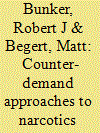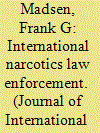| Srl | Item |
| 1 |
ID:
093833


|
|
|
|
|
| Publication |
2010.
|
| Summary/Abstract |
The illegal narcotics demand in the US is discussed in relation to the products supplied by the Mexican cartels. This is then contrasted with major legal commodities with addictive properties consumed in the US. Overlaps of use are also noted. Traditional, right of center, and left of center counter-demand approaches to narcotics trafficking are also surveyed. All of these approaches represent no-win scenarios for the US with its 'troubled population' of addicted users. Final analysis suggests that a blended counter-demand strategy should be explored based on extinguishing demand, coercing the users, and, to some extent, fulfilling user demand by the provision of prescription narcotics to 'special status' addicts and by means of limited decriminalization of personal marijuana use. Such a suggested strategy would have its own negative elements and should be considered less of a bad choice than the other, even worse, US counter-demand policy options that exist.
|
|
|
|
|
|
|
|
|
|
|
|
|
|
|
|
| 2 |
ID:
117962


|
|
|
|
|
| Publication |
2012.
|
| Summary/Abstract |
This year sees the celebration of the first century of international legal provisions against the illicit production and trade of narcotics substances. Accordingly, this is an appropriate moment to evaluate the results obtained. The following essay considers how the international prohibition regime created the crime of drug trafficking. The ensuing function of denied demand is the inescapable basis for the development of organized crime. Second, costs of the regime are critically assessed. The former include institutional costs of law enforcement and of the incarceration of individuals sentenced for drug trafficking and related offences, e.g., violence and financial crimes. The indirect costs are difficult to gauge and impossible to monetize. They include the immense suffering caused by drug trafficking as well as the deterioration of public services due to corruption. The present situation on both sides of the U.S.-Mexico border is sufficiently eloquent evidence. Also, narcotics legislation leads to racial tension since the incarceration rates for non-whites for these offences is considerably higher than for whites in the United State and the United Kingdom. Third, political premises are briefly analyzed, namely the implementation of narcotics liaison offices in foreign jurisdictions and the linking of foreign aid and trade privileges to a certification of trade partners' adherence to U.S. antinarcotic drugs law enforcement. One might claim, somewhat counterintuitively, that decriminalization of drug trafficking is not necessary. Drug trafficking has already been decriminalized de facto, if not de jure, by the sheer, constant saturation of the market place.
|
|
|
|
|
|
|
|
|
|
|
|
|
|
|
|